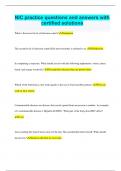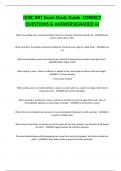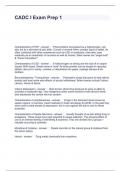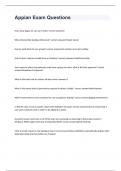Brighton Rock “Contemporary social Two of the poems from the anthology
fears always underpin
Brighton Rock was Greene’s first novel to tackle serious ideas. The Ballad of Reading Gaol
crime fiction.”
In the novel, Greene explores the problems of urbanisation, population
growth and poverty that were affecting Brighton at the time he was writing. Key contextual detail:
The link between poverty and crime can be seen across the crime genre, particularly in Wilde was openly homosexual and convicted of ‘gross indecency’
early works, such of those by Charles Dickens e.g. Oliver Twist.
under the 1895 Act and sent to Reading Gaol.
Crime fiction perpetuated the stereotype that crime is associated with the lower classes;
Brighton Rock further fuels/reinforces this; Pinkie and Rose are of a low social class
The poem is told from Wilde’s perspective, though it was inspired by
(“She didn’t even know the name of a drink.”). Charles Thomas Wooldridge, who was condemned to die in 1896 for
In the early 20th century, Brighton still contained lots of slums. Roy Grant, researcher murdering his wife in a jealous rage. “The poor dead woman whom
and curator of the ‘My Brighton Exhibit’ (1994), commented on how the slums were he loved,/And murdered in her bed.”
“draughty, poorly ventilated… and made out of inferior materials” and how “the police The poem features Wilde’s thoughts on criminals and the justice
would never go into the area unless they were heavily escorted.”
system; in particular, it explores how criminals are victims of the
Slum-like dwellings appear in the novel, most notoriously Nelson Place, Pinkie and
justice system.
Rose’s birthplace. In the novel, Pinkie expresses his contempt for his home: “He thought
he had escaped for ever by the whole length of the parade, and now extreme poverty The ‘ballad’ form of the poem links to Wilde’s intention- comprised
took him back.” of simple, repetitive language- Wilde wanted as many of people to
Some may interpret Pinkie’s “extreme poverty” as a child as his main motive for be able to receive his message; he didn’t want social class to
engaging in a life of crime- some readers may believe that this makes him somewhat of obstacle the spread of his message.
a victim as well/pitiable character? Could also be the reason why he is so jealous of
Key quotations:
Colleoni (“…the memory of Colleoni’s luxury, the crowned chairs at the Cosmopolitan,
- “I never saw a man who looked/With such a wistful eye/Upon that
came back to taunt him.”).
Greene also explores the incompetence and corruption of the Brighton police force. little tent of blue/That prisoners call the sky.”
Greene can be seen to be providing social commentary on the ineptness of the police - “I walked, with other souls in pain,/Within another ring,/And was
force and how it fails to prevent crime and enforce law and order; they are just there for wondering if the man had done/A great or little thing,/When a voice
show. Some may go as far as saying that Greene implies that the Brighton police force behind me whispered low,/’That fellow’s got to swing.’”
encourage crime… - “Who watch him night and day;/Who watch him when he tries to
The police fail to do their job correctly. They conclude that Hale died of “natural
weep,/And when he tries to pray;/Who watch him lest himself
causes”- Ida, who assumes the role of amateur detective, is miles ahead of them,
serving to enhance their inefficiency/indifference/ they declare this due to corruption… should rob/The prison of its prey.”
Context: Metropolitan Police Force were founded in 1829- hated amongst the lower - “We turned the dusty drill: We banged the tins, and bawled the
classes. hymns,/And sweated on the mill: But in the heart of every
Key quotations: man/Terror was lying still.”
- “A mounted policeman came up the road, the lovely cared-for chestnut beast…like an - “In Reading gaol by Reading town/There is a pit of shame,/And in it
expensive toy a millionaire buys for his children…”
lies a wretched man/Eaten by teeth of flame,/In burning winding-
- “It never occurred to Hale watching the policeman pass; he could appeal to him.”
- “I don’t mind you carving each other up in a quiet way…” sheet he lies,/And his grave has got no name.”
- “The policeman looked ill-at-ease like a stranger at a party.”
, “Crime writing presents
Brighton Rock Two of the poems from the anthology
human nature as
fundamentally dark and
One of the many allures of crime writing, particularly more recent
selfish.” Peter Grimes
contributions, is that it permits us to explore the criminal psyche. We
can immerse ourselves in the dark and twisted minds of criminals from the
safety of our own homes… In the poem, Crabbe certainly presents human nature as fundamentally
In Brighton Rock, Greene presents Pinkie’s nature as fundamentally dark and selfish dark and selfish. Peter Grimes’ crimes are unforgiveable. Not only does
due to the lack of remorse he feels for his actions. he murder 3 defenceless orphan children, he also murders his own
After killing Hale, Pinkie says to Spicer: “When people do one murder, I’ve read they father.
sometimes have to do another- to tidy up.”- illustrates Pinkie’s lack of remorse and Key quotations to explore:
dark, selfish nature- he is prepared to commit more murders so he is not suspected - “Nay, once had dealt the sacrilegious blow/On his bare head, and
of the first.
laid his parent low;”
Other key quotations to explore that present Pinkie’s nature as fundamentally dark
- “With greedy eye he look’d on all he saw,/He knew not justice, and
and selfish (his indifference towards murder/his treatment of Rose etc…):
he laugh’d at law;”
- “The word murder conveyed no more to him than the word ‘box’, ‘collar’ or
‘giraffe’.” - “Pinn’d, beaten, cold, pinch’d, threaten’d, and abused-/His efforts
- “When people do one murder, I’ve read they sometimes have to do another- to punish’d and his food refused,-“
tidy up.” - “His liquor fail’d, and Peter’s wrath arose,-/No more is known- the
- “She belonged to him like a room or a chair.” rest we must suppose,”
- “There was poison in his veins, though he grinned and bore it... he was ready for Peter, however, is not the only character in the poem that is presented
more deaths.” as having a fundamentally dark and selfish nature. The people of the
- “It ought to be easy to quiet her. We quieted Fred and Spicer an’ she’s only a kid...” town can be said to also be an accessory to Peter’s evi,l and are even
- “I got the car all ready. We could go out into the country where no one would
somewhat complicit in his murders of the first two orphan boys as they
hear.”
are indifferent to his treacherous actions.
- “He discovered in himself an odd sense of nostalgia for the darkest act of all.”
COUNTER: Not all the characters in Greene’s novel are presenting as being of a
Key quotations to explore:
fundamentally dark and selfish nature, even if they are criminals (e.g. Spicer). - “But none inquired how Peter used the rope.”
SPICER: - “None reason’d thus- and some, on hearing cries,/Said calmly,
- Spicer tells Pinkie how he “just don’t want another killing”. “Grimes is at his exercise,”
- “I didn’t want to have Hale killed; it wouldn’t be fair if I took the drop with the Link to context: the townsfolk do not care about Peter’s actions until
others; I told ‘em not to do it.” they become invested in Peter’s third victim; “some noble sinner’s son”,
- His humanity results in his death: “The Boy looked down at the body, spread-eagled whom they tend to the needs of (“in the town they gave/Fire, food, and
like Prometheus, at the bottom of Frank’s stairs.” comfort, to the gentle slave.”)
- However, even Pinkie himself expresses some doubt in places: “It was as if he were
Crabbe provides social commentary on the flawed, classist society,
being driven too far down a road he only wanted to travel a certain distance.”
which gives rise to human nature being fundamentally dark and selfish.








